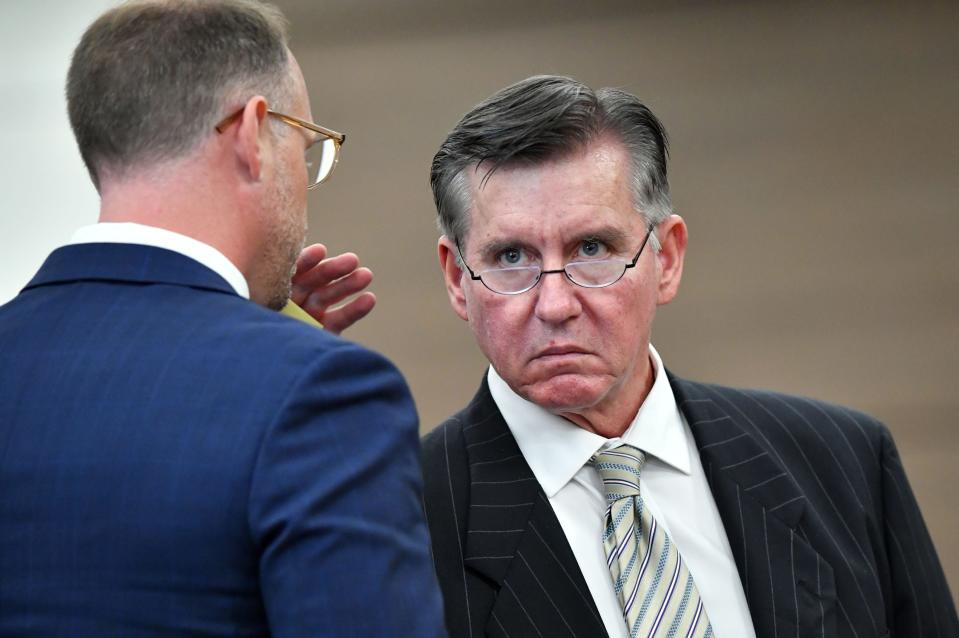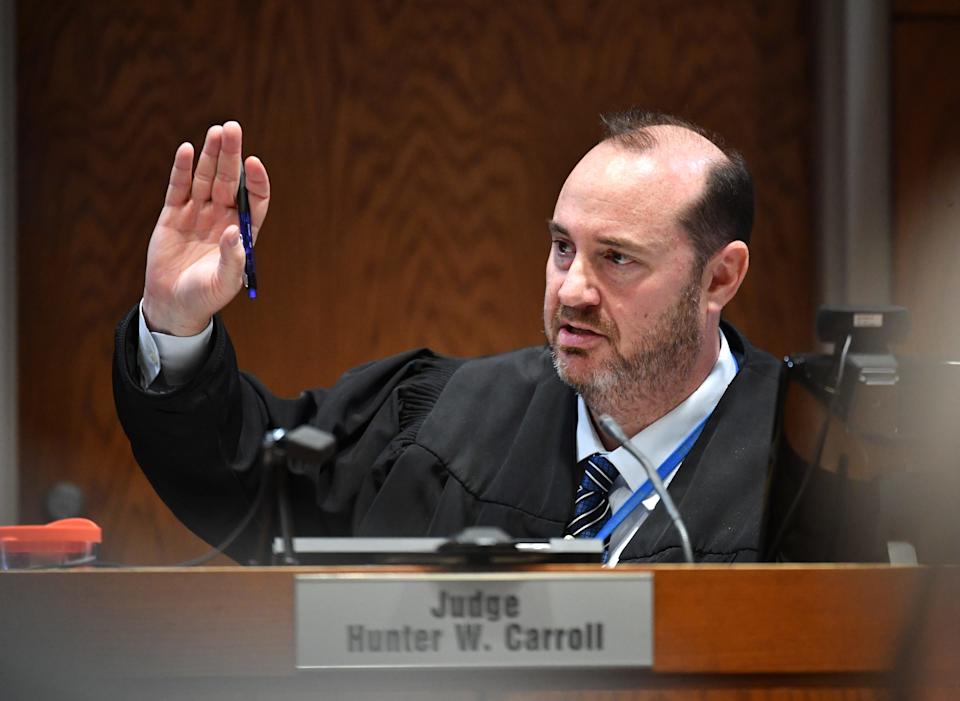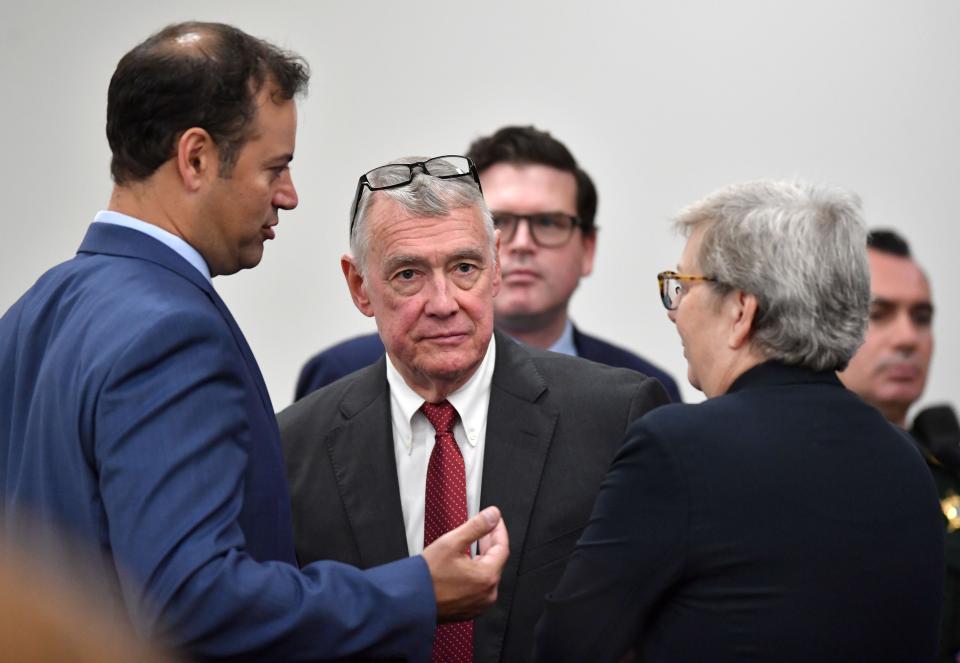Judge partially grants motion decreasing award in 'Take Care of Maya' case by $47.5M
- Oops!Something went wrong.Please try again later.
"Pain more intense than childbirth. Pain more intense (than) kidney stones. Pain more intense than amputating one's limb."
Those are the first sentences a Sarasota judge wrote in his order released Tuesday in which he in part denied and granted a motion filed by Johns Hopkins All Children's Hospital in the 'Take Care of Maya' case.
The order decreased some of the compensatory damages awarded by a jury in November by about $47.5 million but upheld that the hospital was liable for battery, false imprisonment, fraudulent billing, medical malpractice and intentional infliction of emotional distress on Maya and Beata Kowalski. The judge also denied decreasing the $50 million in punitive damages awarded by the jury.
'Take Care of Maya' trial: The verdict is in, jury makes a decision
Latest in ongoing coverage: Sarasota judge denies new trial motion in 'Take Care of Maya' case after juror interview
Sarasota Circuit Court Judge Hunter Carroll released his 17-page order a couple of months after attorneys for the hospital filed a 144-page motion seeking a renewed motion for directed verdict, a motion for a new trial, and a motion for remittitur.
The words he begins his order with are used to describe the pain associated with Complex Regional Pain Syndrome — a condition Maya Kowalski has stated she has and which staff at Johns Hopkins All Children's Hospital continue to believe that she doesn't.
The motion was filed in response to a six-person jury awarding the Kowalski family a little over $261 million in compensatory and punitive damages against Johns Hopkins All Children's Hospital following a two-month-long trial and five and a half years of litigation to get to that point.
The Kowalski family first sued the St. Petersburg-based hospital in 2018 for $220 million more than a year after wife and mother, Beata Kowalski, took her life after child abuse allegations arose against her and a Florida Department of Children and Families investigation led to then 10-year-old Maya Kowalski being separated from her family.
The family took Maya to the hospital in October 2016 due to severe stomachache, which they believed was a relapse of her Complex Regional Pain Syndrome, a disorder that impairs the central nervous system and heightens pain sensations.
Hospital staff began to have suspicions of possible child abuse after they observed what many testified to as inconsistencies between Maya’s behaviors and her condition. Staff placed calls to the abuse hotline, beginning a more than three-month ordeal for the Kowalski family that has haunted them since.
Carroll stated he rejected for the most part without comment All Children's Hospital's contentions but did address a few in his order.
Attorneys for both sides respond to order

The Kowalskis are truly appreciative of the efforts not only of Judge Carroll but all those involved in the case from the Twelfth Judicial Circuit, the family's attorney Greg Anderson said Wednesday in response to the order.
"We continue to be amazed at the amount of ... work and effort Judge Carroll puts into this case," Anderson said.
He added that the family wanted to truly thank many of those involved in the case, including the court deputies who were in the courtroom day-in-and-day-out, employees with the Clerk of Court and Comptroller's Office, and Carroll's judicial assistants who worked late nights to ensure the case moved forward.
While Anderson doesn't agree with everything in the order, including reducing the amount of damages awarded to the Kowalskis, he appreciates the work Carroll has put into the case. He added from his perspective, the Court made the case less appealable, and with interest running about $55,000 a day, "there's no way to justify appealing the case on the basis of a business decision."
"It was a brilliant analysis, but we want to make clear that we don't agree with everything Judge Carroll said, and many times through the course of the trial, we vehemently disagreed with what Judge Carroll's ruling were," he said. "But quality is quality."
Anderson added he feels that the results of the orders, as well as the manner in which Carroll phrased the order, gave the Kowalskis and people across the country hope that the judicial system can and will provide justice to the average family.
The family's attorney also expressed his amazement "at the defense's ability to turn a blind eye to obvious facts" particularly as it related to the assault, battery, and treatment of Maya, as well as the treatment of Beata Kowalski. When asked if there was anything he was surprised about in the order, Anderson said he thought the court might come down harder on the defense.
"I thought he was being extremely fair," Anderson added.
In response, Ethen Shapiro, one of the hospital's attorneys on the case, said that the rulings are just a step in the hospital's road to appeal, as the order demonstrated the "Court's failure to grasp the complex medical, child safety, and legal issues involved in this case."
“The rulings are contrary to Florida law, make a mockery of both due process and the statutory requirements of mandatory reporters, and set a dangerous and unacceptable standard for both abused children and the many thousands of mandatory reporters who are on the front lines of protecting them," Shapiro said in his statement.
“Any fair and unbiased review of the facts and the law in this case completely vindicates the care provided by the experts at Johns Hopkins All Children’s Hospital. It is a sad indictment of the judicial process in this case that those facts were concealed and that the law was misrepresented to the jury."
Shapiro added the hospital will pursue appeals for as long as it takes to reach what the hospital perceives as a "final, just conclusion" for the hospital's physicians, nurses and staff, as well as mandatory reporters who are obligated to report suspicions of child abuse.
"We are confident in our appeal and look forward to demonstrating what many have missed: a one-sided movie is no substitute for the truth,” Shapiro said.
Judge grants slight decrease in amount of damages awarded to Kowalskis

Carroll granted a few of the requests for remittitur, or rulings by a judge lowering the damages granted by a jury. In total, he decreased the damages by about $47.5 million from the total of a little over $261 million.
Carroll decreased the $50 million verdict for Jack Kowalski's survivor noneconomic damages due to Beata Kowalski's death down to $24 million and decreased the $18 million verdict for Jack's economic damages down to $2 million. Both $2 million verdicts for Maya and Kyle's survivor economic damages were lowered to $1.75 million.
Carroll also deemed it appropriate to decrease Jack's economic damages as related to billing fraud from a total of $5 million down to $2. Carroll agreed in the order that the little more than $1.5 million in direct economic damages Jack Kowalski received individually is the maximum he could have received, and thus the $5 million awarded by the jury exceeded the maximum permissible range.
Carroll noted that while he remitted some of the jury awards, it doesn't mean that the rest of the jury's verdicts were "improper or the product of passion."
"An overarching theme of JHACH’s Motion is it did nothing wrong, and its actions were rather ordinary. The jury rejected that view of the evidence. In its Motion, JHACH either ignores or minimizes ample evidence of its misconduct. Having sat through the entire trial, the Court rhetorically wonders what JHACH’s definition would be of an extraordinary action," Carroll's order reads.
Jack Kowalski, individually and as representative of Beata Kowalski's estate, has 15 days to reject the remittitur and elect a new trial on the damages that were decreased.
Keep reading: 'Take Care of Maya' verdict raises questions for child healthcare providers
More coverage: Maya Kowalski files complaint related to sex abuse allegations with St. Petersburg police
Denial of expanding scope of immunity, adverse effect of adding time
Carroll denied the hospital's request to expand the scope of immunity under Chapter 39, which grants any person, official, or institution immunity from prosecution if they in "good faith" reported suspicions of child abuse, neglect, or abandonment.
He found that the hospital did not explain why Maya's medical records were not filled with reports, observations, photographs, and other notes describing what was being done to Maya, despite the hospital claiming in the motion and during the trial that everything that was done to Maya while she was at the hospital from October 2016 to January 2017 was for medical reasons.
"Certainly, the jury was presented with evidence — and the lack of medical records — explaining the necessity to place a commode just outside of Maya’s reach, and then intentionally delaying in coming to help her use the restroom, causing her to defecate on herself," the order states. "If stripping a child and taking the photographs was done for medical reasons, where’s the concurrent medical record evidence? These are but a few of the cruel acts for which JHACH seeks immunity."
During the trial, the issues surrounding Chapter 39 immunity were repeatedly brought up, with both sides at times hedging into evidence or arguments that were protected under the Florida statute.
Carroll points out that the hospital's attorneys objected to and criticized efforts by the family's attorneys to introduce events that happened in the dependency court proceeding during the trial, while at the same time trying to argue the core claim from that hearing that Beata Kowalski committed medical child abuse because she suffered from Munchausen syndrome by proxy.
Despite the family's attorneys objecting, Carroll allowed the hospital to provide some evidence connected to their theory of Munchausen by Proxy "because it gave context to how Maya Kowalski presented to JHACH in October 2016." Carroll did note that the family's attorneys complained that the hospital was using Chapter 39 "as both a sword and shield."

Carroll stated the reality remained that Johns Hopkins All Children's Hospital battered Maya Kowalski on at least two separate occasions, falsely imprisoned her on three separate occasions, intentionally inflicted emotional distress on Maya and her mother, Beata Kowalski, submitted fraudulent bills and committed medical malpractice on Maya Kowalski.
While the hospital through its attorneys has stood by the argument that they are protecting mandatory reporters, Carroll states that the Legislature didn't adopt Chapter 39 immunity to "immunize a hospital that intentionally harms a child."
Further, Carroll found that the addition of time to provide each side more time for questioning witnesses did not adversely impact the hospital.
Due to the nature and complexity of the case, Carroll in the beginning granted both sides only 55 hours per side to present evidence and testimony and to cross-examine witnesses. However, because the jurors unexpectedly asked a substantial number of questions, Carroll granted each side an additional four hours and then awarded an extra two and a half hours for cross-examination when the hospital was presenting its case.
Carroll pointed out that he allowed attorneys for the hospital to recall witnesses if they needed.
Gabriela Szymanowska covers the legal system for the Herald-Tribune in partnership with Report for America. You can support her work with a tax-deductible donation to Report for America. Contact Gabriela Szymanowska at gszymanowska@gannett.com, or on X: @GabrielaSzyman3.
This article originally appeared on Sarasota Herald-Tribune: Sarasota judge decreases award in 'Take Care of Maya' case by $47.5M

